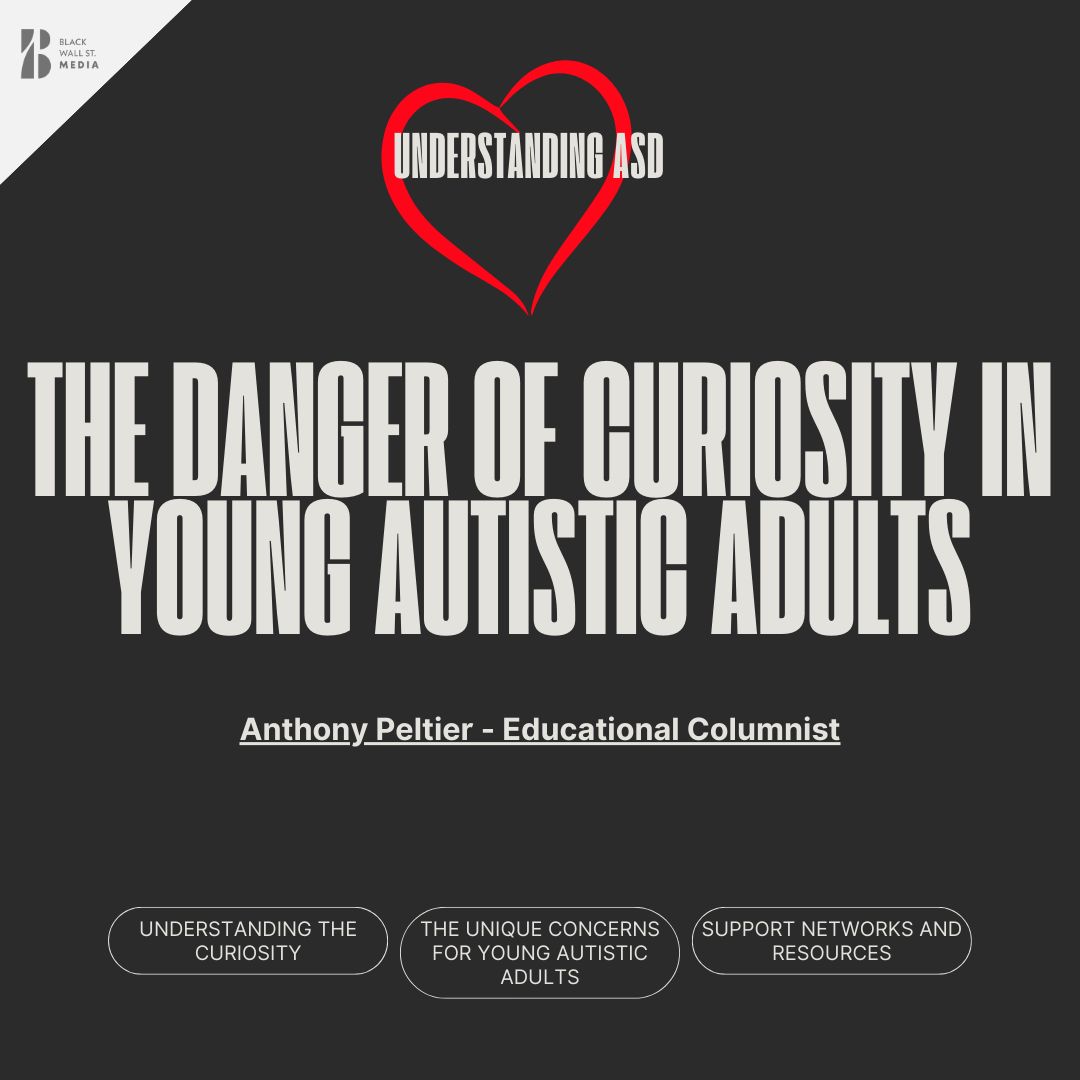EDUCATION
The Danger of Curiosity in Young Autistic Adults
“Empathy is the bridge that connects understanding to acceptance. In embracing the unique journeys of individuals with autism, we build a world where differences are celebrated, and every story becomes a testament to the beauty of diversity.”
Anthony PeltierEducational Columnist

The Danger of Curiosity in Young Autistic Adults
It’s normal for all people, including those on the autism spectrum, to be curious about sexuality. However, it’s important to understand that some young adults with autism might show curiosity towards pornography.
This can raise serious concerns about their well-being, relationships, and how they interact with others. In this article, we will explore why young adults with autism might become curious about pornography and talk about the potential consequences.
We will also compare this to when non-autistic children show the same curiosity, highlighting the unique challenges that autistic individuals may face in this situation. Additionally, we will provide information about organisations that offer support systems for family and friends who are worried about these concerns.
Understanding the Curiosity:
Neurological Factors: Some people with autism have brains that develop differently, which affects how they process information and understand social situations. Some individuals with autism might have very sensitive senses and be more interested in things they see, like explicit pictures or videos. But it’s important to know that not all autistic people are like this. The increased interest in visual things, including explicit images, might be because of how their brains work and their focus on visual details and patterns. This intense fascination with certain visual things is unique to each person with autism.
Naivety and Social Skills Challenges: Some autistic people have trouble understanding social cues, knowing what’s appropriate in relationships, and understanding sexual behaviours.
Because of this, they may have a harder time navigating relationships and interactions with others.
Their lack of awareness or naivety can make them more likely to seek out or accidentally come across explicit pictures or videos, like pornography, because they’re curious or wanting to learn.
This lack of social understanding can also make them more vulnerable to potential risks, like seeing explicit content online.
Focused Fixations and Repetitive Routines:
Some people with autism have a tendency to become very fixated on certain things and engage in repetitive behaviours.
These fixations can be about specific topics, objects, or activities. It’s important to know that not all autistic individuals develop an interest in explicit imagery or pornography.
For example, one autistic person might have a strong passion for trains. They might spend a lot of time learning about different train models, collecting train-related things, and talking about trains. Another autistic person might be really into astronomy.
They might spend hours studying stars and planets, reading about space missions, and looking at the night sky. Sometimes, autistic individuals might start focusing intensely on explicit imagery or pornography.
This fixation could come from curiosity, a desire for information, or a need for sensory stimulation.
It’s crucial to understand that this behaviour doesn’t come from bad intentions or being immoral. It’s just a way their unique brains process information and develop interests.
However, it’s important to address and manage these fixations in a way that promotes healthy social interactions and relationships.
Sensory Regulation:
Sensory regulation is about how our bodies process and handle information from our senses, like what we see, hear, and feel. Autistic people sometimes struggle with this, which can make it hard for them to do everyday things.
When it comes to pornography, which has explicit content and things that stimulate our senses, autistic people can react differently based on what they like. Some autistic individuals might find pornography a way to escape or explore intense sensory experiences.
It can be a way for them to calm down or feel better by focusing on the visuals and sounds. It’s sort of like finding comfort in their own world of senses. But for others who are more sensitive to certain sensory things, pornography can be too much.
The explicit and graphic nature of it can cause too many sensations and make them feel anxious, confused, or uncomfortable. This can have negative effects on their social lives and relationships.
It’s important to remember that everyone is different, so how pornography affects someone’s sensory regulation will vary from person to person.
The Unique Concerns for Young Autistic Adults:
Exploitation and Vulnerability:
Autistic individuals may be more vulnerable to exploitation and harm in social situations due to their difficulties in understanding social dynamics, recognising risks, and comprehending the potential dangers associated with engaging with explicit material such as child pornography.
Research studies have highlighted the social vulnerability of individuals with autism, noting challenges in detecting risk, difficulties in understanding social cues, communication barriers, and a higher likelihood of experiencing abuse, victimisation, and mental health issues.
Lack of Sexual Education: Many autistic individuals may not receive thorough sexual education, which means they might not have all the information they need to understand sexuality and appropriate behaviour.
This lack of education can lead to increased curiosity about pornography, as they may see it as a way to learn about sex or feel confused about what is considered acceptable in terms of sexual behaviour.
Emotional Well-being and Relationships:
Watching too much pornography or being overly focused on explicit content can negatively affect the emotional well-being and relationships of young autistic adults.
It can create unrealistic expectations about sex and relationships, make it harder for them to form healthy connections with others, and make it challenging for them to understand consent and boundaries in relationships.
When comparing autistic and non-autistic children’s curiosity about pornography, there are important social consequences to consider:
Social Understanding and Peer Influence:
Non-autistic children typically have a better understanding of social norms and peer influence.
They are more aware of what is considered appropriate and are influenced by their friends. On the other hand, autistic children may show curiosity without fully grasping societal expectations or the impact of their actions.
Coping Mechanisms and Emotional Regulation:
Autistic children may use repetitive behaviours or fixations, including an intense interest in explicit material, as a way to cope with their emotions or sensory experiences.
Non-autistic young people may employ a range of coping strategies and emotional regulation techniques. They may rely on social interaction, hobbies, or other activities to manage their emotions and navigate challenging situations.
The curiosity for pornography among young autistic individuals is a complex issue influenced by neurological factors, limited understanding of social norms, restricted interests, and sensory challenges. I
t is important to address this curiosity with appropriate support and resources. Providing comprehensive sexuality education tailored to the specific needs of autistic individuals, promoting healthy relationships, and encouraging open dialogues can help mitigate potential risks and ensure their overall well-being.
By acknowledging these concerns and offering specialised support, we can empower young autistic individuals to navigate their curiosity in a safe and informed manner.
Support Networks and resources:
Here are several organisations that offer support systems for families and friends who are concerned about their autistic young adults fixated with pornography and explicit materials:
Choice Support (https://www.choicesupport.org.uk) Choice Support is a charitable Community Benefit Society, formed in 1984, that supports autistic people, people with learning disabilities and/or mental health needs.
NHS Autism Services (https://www.nhs.uk/conditions/autism/autism-and-everyday-life/help-for-families/):
The NHS provides information and support for families of autistic individuals, including resources specific to autism and everyday life challenges.
They can offer guidance on managing fixations, promoting healthy relationships, and accessing appropriate support networks.
Action for Autism (https://actionforautism.co.uk/): Action for Autism is a charity that aims to improve the lives of people with autism and their families.
They provide support groups, workshops, and educational resources for families dealing with specific concerns, including those related to fixations and obsessions.
Daisy Chain (https://www.daisychainproject.co.uk/): Daisy Chain offers a range of support services to autistic children and adults, including those with fixations or obsessions.
They provide practical help, advice, and therapeutic activities to promote positive well-being and manage challenging behaviours.
Ambitious About Autism (https://www.ambitiousaboutautism.org.uk/): Ambitious About Autism is a national charity dedicated to supporting young people with autism and their families.
They offer a range of services, including advice and resources on managing fixations and obsessions sensitively and effectively.
The Autism Directory (https://www.theautismdirectory.com/): The Autism Directory is an online directory that connects families and individuals with autism to various support services and resources.
They provide information on local support groups, therapists, and organisations specialising in supporting individuals with fixations and obsessions.
Useful web articles
Autism Sensory Strategies | The Spectrum
Sensory Issues – Autism Speaks
Sensory Integration in Autism Spectrum Disorders
Sensory Strategies to Calm and Engage Children with
Sensory Processing in Autism: A Review
Effectiveness of Sensory Integration Interventions in
Sensory Integration Therapy and Autism – Verywell Health
Sensory regulation strategies – how you can use them to
The Power of Sensory Regulation: Unleashing Well-being
These organisations and publications, including the UK police, offer valuable resources, guidance, and support networks to families and friends dealing with concerns related to autistic young adults fixated with pornography and explicit materials.
It’s important to seek assistance from professionals who can provide tailored support and strategies for managing these challenges effectively.
In cases where a vulnerable autistic young adult has been exploited and encouraged to seek explicit images of children, the involvement of the police service is essential to address and prevent further harm.
We encourage readers to independently verify the information obtained from these sources and exercise their own judgment when interpreting and using the information.
Any reliance on the information provided by these sources is at the reader’s own risk.
Black Wall St. MediaContributor








